Thinking about trying CBD? First, know about its safety. While it’s getting popular, be mindful of side effects, drug interactions, and necessary precautions.
CBD comes from the cannabis plant and may help with various health issues. However, remember to consider the risks when using CBD products.
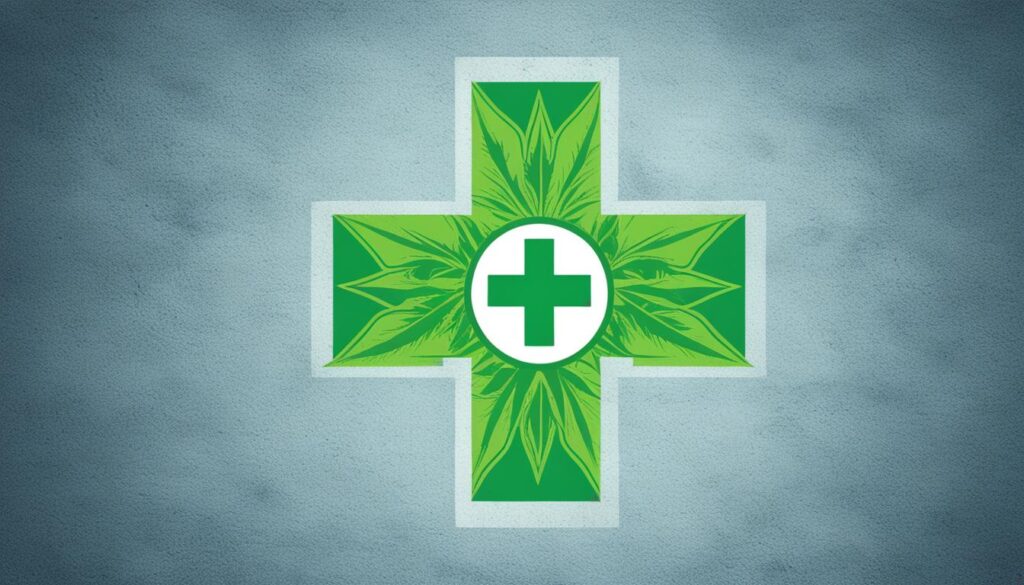
Key Takeaways:
- Non-FDA-approved CBD products differ in composition and lack evidentiary support for their safety.
- CBD and THC are the two most common cannabinoids in the cannabis plant. CBD lacks psychoactive effects, while THC produces mind-altering effects.
- The legality of CBD products depends on the concentration of THC and varies between states.
- Potential side effects of CBD include tiredness, diarrhea, and changes in appetite or weight.
- CBD has the potential to interact with certain medications and may have risks associated with liver toxicity and reproductive and developmental effects.
Understanding Cannabis, CBD, and THC
The cannabis plant is fascinating, with over 500 chemical parts. It includes more than 100 cannabinoids. Two well-known ones are CBD and delta-9 THC. Let’s learn more about them.
CBD, or cannabidiol, doesn’t make you feel high. It’s found in cannabis but works differently from THC. It might help the body and mind without the psychoactive effects.
Delta-9 THC, on the other hand, is what gives cannabis its kick. It attaches to the brain’s receptors and can make you feel euphoric or relaxed. It changes how we see, feel, and hear things.
“CBD and delta-9 THC interact with receptors in the brain and body, producing different effects.”
CBD and THC are just starters. Cannabis has many other compounds too. Each has unique effects and benefits that scientists are studying.
| Cannabinoid | Psychoactive Effects |
|---|---|
| CBD (cannabidiol) | No psychoactive effects |
| Delta-9 THC (tetrahydrocannabinol) | Potential for psychoactive effects |
| CBG (cannabigerol) | Non-psychoactive |
| THCV (tetrahydrocannabivarin) | May have psychoactive effects |
CBD products come in different strengths and types. This means they can work in various ways. Always pick trustworthy brands and read labels to get what you need.
Exploring cannabis reveals more than just CBD and THC. It’s a plant full of surprises with much for us to discover.
Legal Definitions and Availability of CBD Products
To grasp the legal situation of CBD, we must know the terms CBD, hemp, and marijuana. The critical factor is the delta-9 THC content. This defines if CBD products are legal.
Hemp is a cannabis plant with less than 0.3% delta-9 THC. This makes it legal across the US. In contrast, marijuana, having more THC, is illegal federally.
Federal laws say hemp-derived CBD is legal. But, rules differ from state to state. Thus, how safe and effective CBD products are may depend on your location.
You can buy CBD products, except Epidiolex, almost anywhere in the US. They are in stores and online. Yet, buying CBD calls for caution due to inconsistent quality control in the industry.
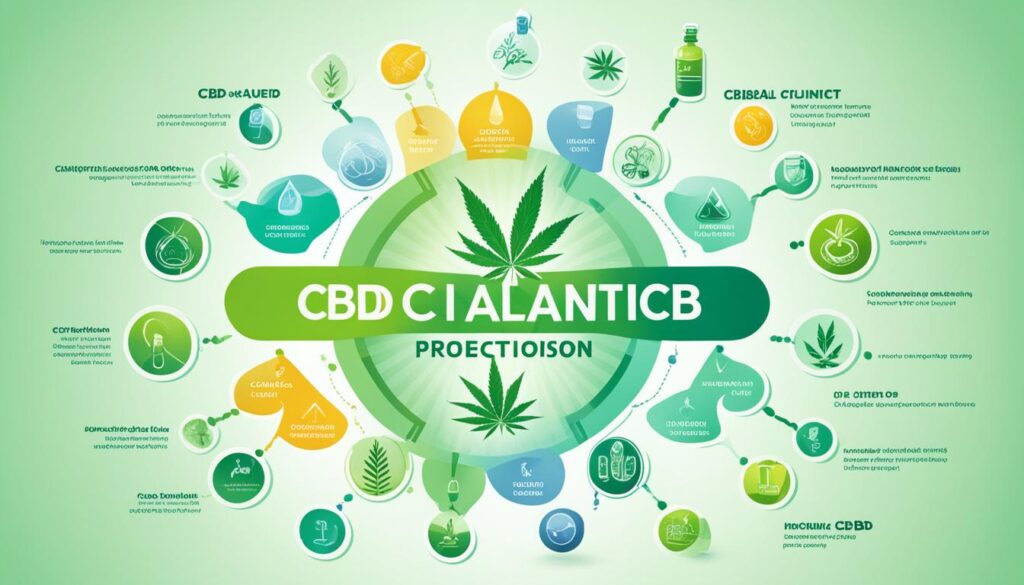
State Regulations on CBD Products
“State rules on CBD are complex and change often. Consumers should keep up with their state’s laws. This ensures they follow the law and use safe products.” – Dr. Emily Thompson, CBD Researcher
State laws impact the legality and availability of CBD products. Some states are more open, allowing various CBD items. Others have strict regulations, limiting certain CBD products.
Overview of CBD Legality by State
| State | Legality | Additional Regulations |
|---|---|---|
| California | Legal | Products must adhere to labeling and testing requirements |
| Texas | Legal | No more than 0.5% THC concentration |
| Florida | Legal | Products must be derived from hemp and contain no more than 0.3% THC |
| New York | Legal | No smokable CBD products allowed |
| Colorado | Legal | No additional restrictions |
Potential Side Effects of CBD
CBD is usually safe, but it’s still good to know about possible side effects. Not everyone will have these issues, but some might notice:
- Tiredness: CBD can make some people feel sleepy or tired.
- Diarrhea: A few people might get an upset stomach, leading to diarrhea.
- Changes in Appetite and Weight: CBD could change how much you want to eat. This can lead to weight changes.
Side effects can be different for each person. While many won’t have any issues, some could feel these effects. It’s smart to talk to a doctor if you’re unsure, especially if you’re already dealing with health issues.
Talking to a healthcare expert is always the best step. They can guide you based on your health status. This ensures using CBD is both safe and enjoyable for you.
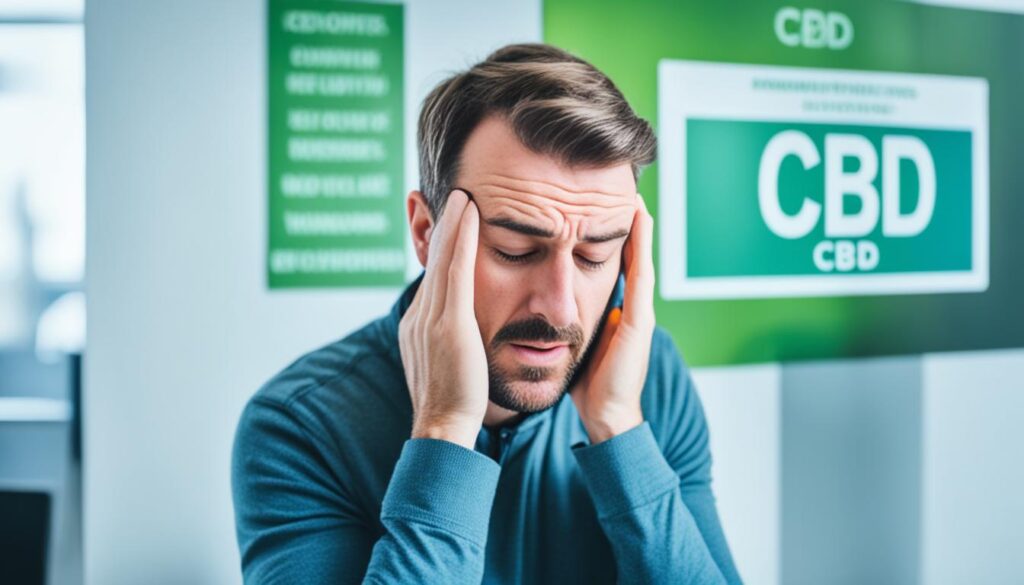
Drug Interactions and Precautions of CBD
When thinking about using CBD, knowing about possible drug interactions is key. CBD can affect how certain drugs work, especially those processed by liver enzymes. These interactions may change how drugs are broken down and could lead to side effects or less effectiveness.
Rarely, CBD has been linked to liver issues. It’s vitally important to consider this risk, especially if your liver is already weak or if you’re on liver-straining drugs.
CBD might also affect reproduction and development. Research in this area is scarce, but some studies hint at CBD’s impact on fertility and pregnancy. If you’re trying to conceive, are pregnant, or have reproductive health concerns, talking to a health professional about CBD is wise.
To stay safe and reduce risks, talking to a health expert before trying CBD is best. They can offer advice tailored to your health background, current medications, and specific needs.
Case Study: Reported Drug Interactions
“A study in the Journal of Epilepsy Research showed CBD raised blood levels of the epilepsy drug clobazam. This could increase the chance of clobazam’s side effects, like feeling sleepy or sedated.”
Common Medications Metabolized by the Cytochrome P450 Enzymes
| Medication | Drug Class |
|---|---|
| Lisinopril | ACE Inhibitor |
| Warfarin | Anticoagulant |
| Fluoxetine | Antidepressant |
| Omeprazole | Proton Pump Inhibitor |
| Simvastatin | Statins |
It’s crucial to understand how CBD might interact with your medications. If you take any meds from the above list, talk to your healthcare provider. They can help decide if CBD is safe for you.
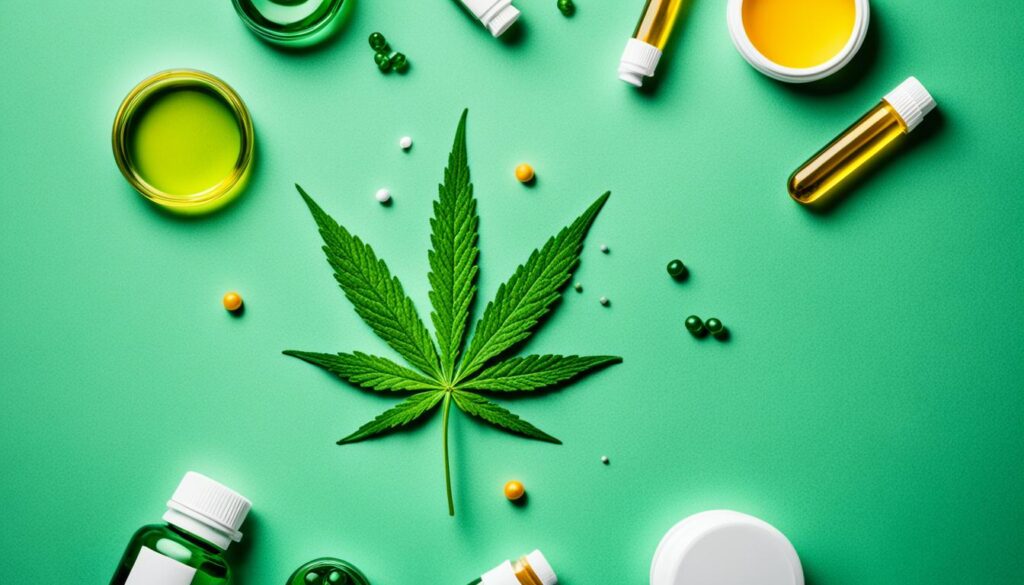
Limited Evidence and Research on CBD
CBD has become popular for treating many health issues. However, we lack solid evidence to back up these uses. While some studies are optimistic, we need more clinical trials to confirm CBD’s safety and effectiveness for certain conditions.
People often consider CBD for anxiety, pain, epilepsy, and sleep troubles. But it’s vital to use CBD wisely, based on real evidence.
“There’s some evidence that CBD could help with certain conditions. But we need more thorough studies to understand its effects and how well it works.”
We need further studies to check if CBD is safe and effective. These studies should be larger and more rigorous. Such research will help us learn how CBD affects the body and its possible benefits.
Before using CBD, it’s wise to talk to doctors and make choices based on solid facts. Relying on unproven claims can lead to treatments that don’t work and might be unsafe.
CBD might be helpful, but we must realize more studies are necessary. By funding more research, we can grow our knowledge and give sound advice to those exploring CBD as an alternative treatment.
Charting the Progress: A Look at Current Research on CBD
| Health Condition | Current Research |
|---|---|
| Anxiety | Some small studies suggest CBD could ease anxiety. Yet, we need more research to find out proper doses, long-term effects, and possible drug interactions. |
| Chronic Pain | Initial findings show CBD might help with chronic pain. More research is necessary to confirm its effectiveness, right dosages, and safety over time. |
| Epilepsy | CBD might lower seizure rates in certain epilepsy cases, leading to FDA approval for Epidiolex. More study is needed on its use in various epilepsy types and potential side effects. |
| Insomnia | Early studies indicate CBD could improve sleep. However, we need larger and more consistent research to prove its effectiveness and safety over the long term. |
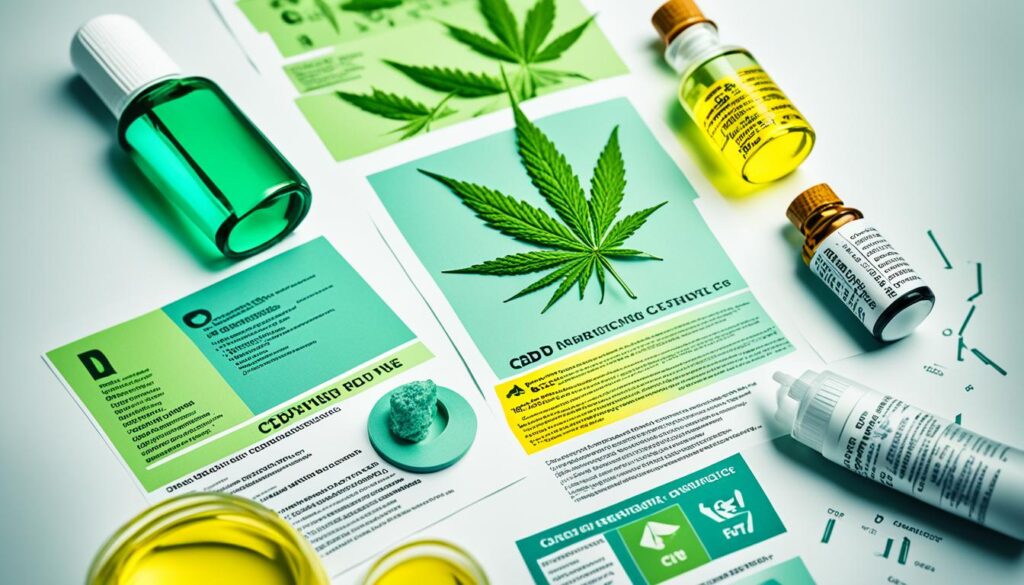
The current research on CBD shows we have a lot to learn about its health benefits and risks. More studies will help create clear, safe, and effective guidelines for using CBD.
CBD Contamination and Mislabeling
When talking about CBD, we often worry about contamination and wrong labels. Products not checked by the FDA face these issues. Contamination means harmful substances, like THC, may be in CBD items. Mislabeling happens when the product’s CBD amount isn’t what the label says.
During making, products might get tiny bits of THC or other bad stuff in them. These can harm especially those who react badly to THC. It’s very important for makers to check quality closely. This makes sure CBD items are safe and clean.
Consumers should also know about mislabeling. Wrong CBD levels on labels can cause effects people weren’t ready for. This wrong info can trick someone into buying something they didn’t want. Choosing brands that are clear and test their products through others is smart.
Contamination and mislabeling are big problems in the CBD world. If there’s no strict quality check, people might face health risks or unexpected results.
To stay safe, pick CBD goods from trusted brands that care about quality. Look for items tested by outside labs. These tests should check for clean, strong, and safe products. Lab results should be easy to find for buyers. This helps you make smart choices and avoid bad surprises.
Table: Examples of CBD Contamination and Mislabeling Issues
| Issue | Impact |
|---|---|
| Presence of THC | Potential for psychoactive effects and legal implications |
| Heavy Metal Contamination | Potential toxicity and adverse health effects |
| Inaccurate CBD Concentration | Inconsistent effects and ineffective dosing |
| Mislabeling of Ingredients | Unintended exposure to allergens or undesired substances |
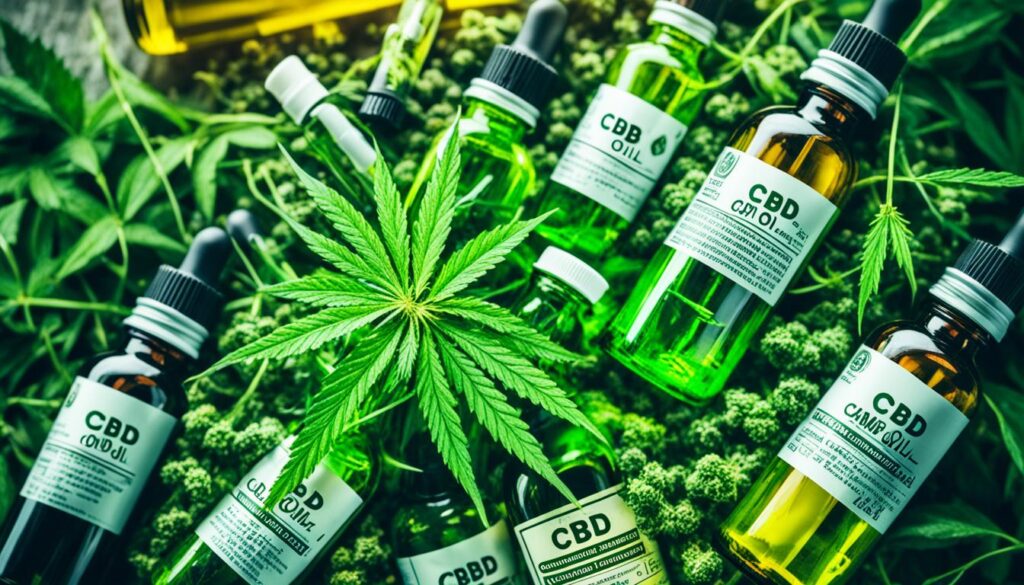
Considerations for CBD Purchasing and Usage
When buying CBD products, think about a few key things. This helps you make smart choices. This way, you’ll pick products that are safe, reliable, and work well.
Reputation and Credibility
First, consider the seller’s reputation and credibility. The CBD market is now full of brands. Not every brand maintains high-quality standards.
Do your research. Pick a brand known for being open, using quality ingredients, and showing testing results from other labs. Look for brands with good reviews, a strong track record, and safety certifications.
Quality and safety of CBD products can differ a lot. It’s key to choose a manufacturer you can trust. They should meet industry standards.
Dosage Guidelines and Starting with a Low Dose
Dosage is another key thing to consider for CBD use. CBD comes in forms like oils, tinctures, capsules, or edibles. Make sure to follow the manufacturer’s dosage instructions to use it safely and effectively.
Starting with a low dose is very important, especially for new users. Since everyone’s body reacts differently to CBD, a small dose helps you see how your body responds. If needed, you can slowly increase the dose. Remember, start low and go slow.
Professional Guidance
Seeking a healthcare professional’s advice is highly advised when looking into using CBD. They can offer advice tailored to your health needs and any possible drug interactions.
This is crucial if you have existing health issues, are on medication, or if you’re pregnant or nursing. Your healthcare provider can guide you through using CBD. They’ll ensure it fits with your health and wellness plans.
| Consideration | Importance |
|---|---|
| Reputation and Credibility of the Manufacturer | High |
| Dosage Guidelines and Starting with a Low Dose | Medium |
| Professional Guidance | High |
Taking into account the manufacturer’s reputation, dosage guidelines, and seeking advice helps in making wise choices. Safely adding CBD to your wellness routine becomes easier.
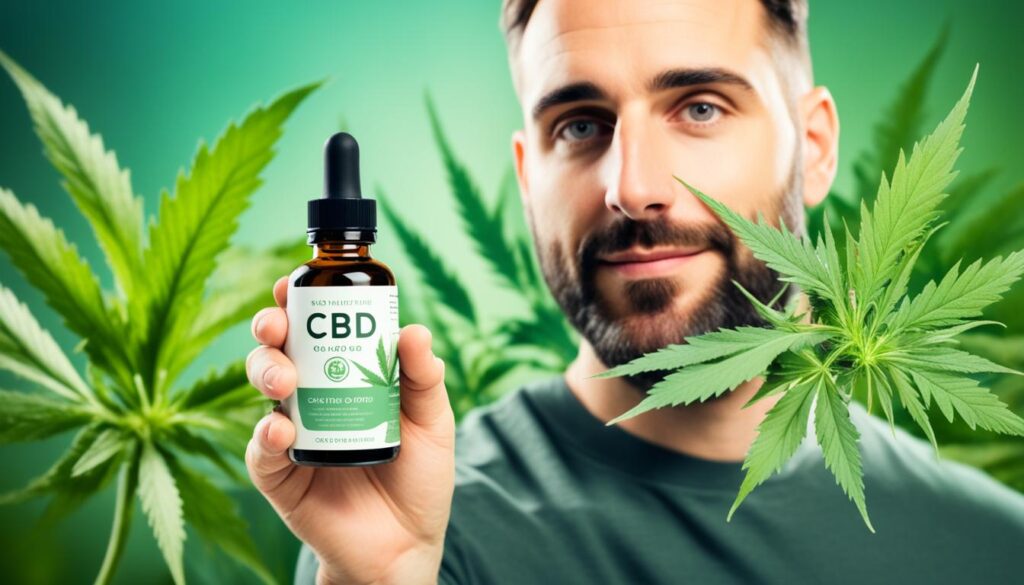
Remember, safety with CBD is very important. By keeping these considerations in mind and being proactive, you can look after your health and well-being.
Conclusion
CBD safety matters a lot for people looking into its use. Ongoing research highlights risks and side effects. So, it’s vital to stay informed. Educated decisions and talking to healthcare pros help safe use.
Using CBD requires caution. Knowing current evidence limits helps in making smarter choices. Learning about CBD safety and risks lets people decide wisely.
Before using CBD, talking to healthcare pros is a must, especially for those with health issues or on medications. They give personalized advice and dosage tips. This makes using CBD safer and more effective.
If considering CBD, focus on product quality and trustworthiness. Buy from trusted makers and follow dosage advice. By being informed and choosing wisely, customers can use CBD with confidence.